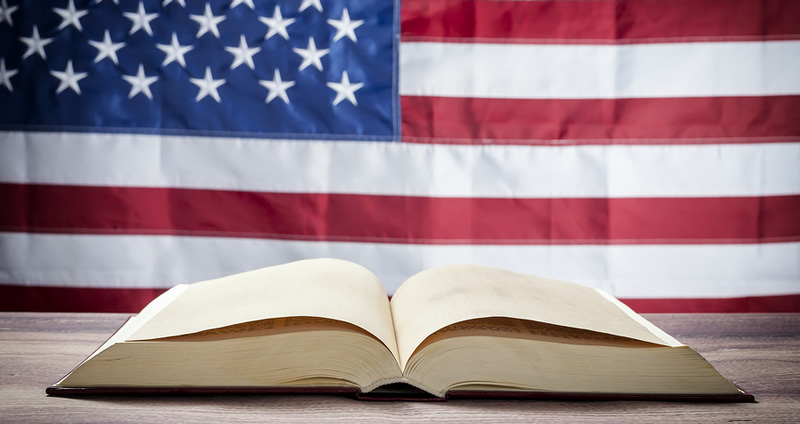
CLEVELAND—While Republicans gathered in Cleveland to confirm their nominee and settle on a platform, the Diocese of Cleveland, too, began preparing for the upcoming national election.
As director of the diocesan Social Action Office, Sister Kathleen Ryan, a Sister of Notre Dame, oversees efforts to educate Catholics in the diocese on “Forming Consciences for Faithful Citizenship,” the U.S. bishops’ quadrennial document on political responsibility.
“They (the bishops) make it very clear that we don’t give up any aspect of citizenship to be a Catholic,” Sister Ryan said. “In fact, because we have a values system, we can use it to enhance and influence the democracy that calls for — by its very definition — participation.”
The document reflects on long-held concerns related to abortion and the needs of poor people. It also references emerging issues related to court decisions on same-sex marriage, public policies that impact religious freedom and a rising concern for the environment as climate change affects more people around the world.
An introductory note states that the document is meant to offer “our guidance for Catholics in the exercise of their rights and duties as participants in our democracy.” The bishops call on Catholics to study the document “prayerfully and in its totality.”
The U.S. bishops at their fall general meeting in November approved revisions to the document. It is longer than its predecessors, issued for the previous presidential election years.
“Faithful Citizenship” draws on the words of Pope Benedict’s 2009 encyclical “Caritas in Veritate” (“Charity in Truth”) and Pope Francis’ “Evangelii Gaudium” (“The Joy of the Gospel”) and “Laudato Si’, on Care for Our Common Home.” The revision includes at least 25 quotations from Pope Francis.
“There are Catholic issues and we raise these issues to both parties,” Sister Ryan told Catholic News Service. “We are very anxious to see the platforms of both parties.”
She noted that “Faithful Citizenship” could instruct Catholics active in politics about Church teaching and who in turn might influence the positions of their respective parties.
“Things like Catholic education, Catholic health care, Catholic social services are all an outgrowth of what we do on Sunday,” Sister Ryan said. “The last thing our priest tells us is, ‘Go in peace to love and serve the Lord.’ We are not a worship-only Church.”
To make Catholics in the eight counties of the Cleveland Diocese aware of “Forming Consciences for Faithful Citizenship,” the Social Action Office will make presentations to pastors, parochial vicars and parish staff at regional meetings in September.
The Social Action Office distributes materials, including a CD with other resources, the USCCB’s suggested ways that parishes can educate their voters, and USCCB’s list of what to avoid. Supplied with this information, individual parishes choose activities to reach their members, such as discussion groups and formal presentations.
Before the past two national elections, Father Gerald Bednar, who is vice rector of St. Mary Seminary and teaches theology there, addressed Catholics at well-attended meetings. He described the principles set forth in “Forming Consciences for Faithful Citizenship,” and he advised attendees to consider factors such as a candidate’s past performance and whether or not a nominee avoids issues or “plays fast and loose with the facts.”
“There is no perfect candidate,” Father Bednar said. “It’s difficult in this election because both candidates have expressed opinions opposed to Catholic principles.”
To give a fair hearing to both sides, Father Bednar recommends that voters read a liberal newspaper, such as The New York Times, and a conservative newspaper, such as The Wall Street Journal, for two weeks and then compare those reported views to Church teaching.
Sister Ryan said the Social Action Office does not overlook the youngest voters. She serves as the diocesan liaison to the Catholic Schools for Peace and Justice network, a longtime fixture in each of the diocese’s 20 Catholic high schools. Representatives in individual schools deliver materials to designated teachers or guidance counselors to use as they choose. Students in schools that hold mock elections, for example, apply the information when selecting candidates.
“In the (Catholic) colleges, we have a similar relationship,” Sister Ryan said. “We have a long history of social action in this diocese, and so we have very good relationships with all these different entities.”
She hopes Catholic voters will familiarize themselves with “Forming Consciences for Faithful Citizenship” before the November election.
“I’m very grateful to the bishops for coming out with this document as a way of informing people of the issues that are of importance in our day, (and) of their hope and encouragement to be an active citizen,” Sister Ryan said. “It’s really a gift to the Church because it helps us focus on the things that might not get the attention otherwise.”
Jerri Donohue | Catholic News Service
EDITOR’S NOTE:
The English-language text of “Faithful Citizenship” can be found here.
The Spanish-language text can be found here.
The South Carolina Catholic Conference provides information about public policy concerns of the Church in the Diocese of Charleston.
Visit www.sccatholicconference.org for more information and to download a brief 2016 Presidential SC Primary Voter Guide.

